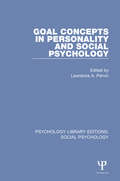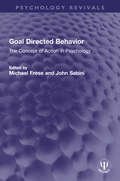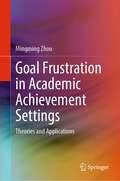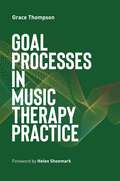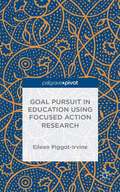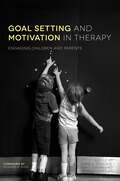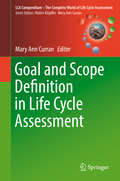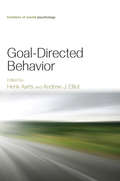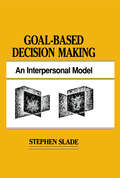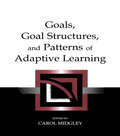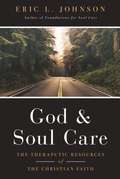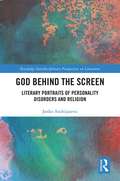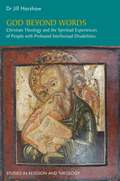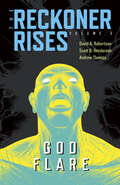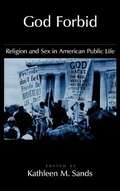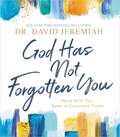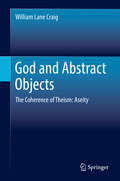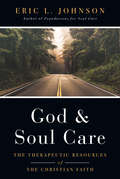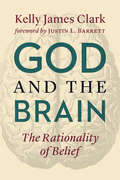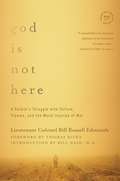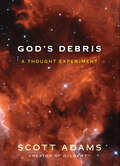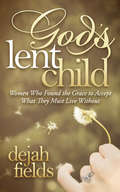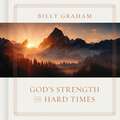- Table View
- List View
Goal Concepts in Personality and Social Psychology (Psychology Library Editions: Social Psychology)
by Lawrence A. PervinIs behavior motivated? And if so, can it be motivated by the anticipation of future events? What role does cognition play in such motivational processes? And, further, what role does motivation play in ongoing cognitive activity? Questions such as these provide the foundation for this book, originally published in 1989. More specifically, the chapters in this book address the question of the utility of goals concepts in studying motivation and social cognition.
Goal Directed Behavior: The Concept of Action in Psychology (Psychology Revivals)
by Michael Frese; John SabiniOriginally published in 1985, this book was an attempt at a comprehensive review of the psychology of action in various areas of psychology. It is also an attempt to bridge two languages and traditions in psychology: German and Anglo-American. Although Anglo-American psychology had had an enormous influence on German psychology, the influence had not gone the other way around – at least not in recent years. Therefore, this book attempts to get the two traditions to speak with each other. The main article, from one language area, and the following discussion, from the other language area, together result in an extensive treatment of an action-theoretic approach in the respective psychological area; thus, both the main article and "discussion" should be read together.
Goal Frustration in Academic Achievement Settings: Theories and Applications
by Mingming ZhouThis book provides in-depth description, explanation, and discussion of goal frustration. It brings together a repertoire of perspectives and strategies that educators and scholars from diverse educational contexts have conceptualized and/or implemented in order to monitor, control, or overcome the occurrence of frustration. This book describes the new technologies can be applied in the conceptualization and operationalization of goal frustration. It also discusses the strategies and pedagogies we can use to cope with this emotion. This book offers evidence-based reports of goal frustration as well as data-driven approaches by presenting both theoretical account and empirical evidence that are grounded in educational and psychological research. This work will appeal to a wider readership from practitioners, parents, to educational researchers.
Goal Processes in Music Therapy Practice
by Grace ThompsonThe processes around identifying therapeutic goals with your client are at the centre of ethical music therapy practice. A combination of primary qualitative research with existing literature allows for a thorough understanding of how goal setting is influenced by both the therapist and the person with whom they work, and the levels of collaboration possible between client and therapist in different settings. Downloadable worksheets, reflective tasks, case examples and guidelines on goal writing puts the theory into action.Providing a detailed model and set of principles that you can apply to any context and strengthen your practice; this book makes essential reading for music therapy students and practitioners looking to hone and update their skills.
Goal Pursuit in Education Using Focused Action Research
by Eileen Piggot-IrvineNot everyone finds goals easy to select or focus on, despite escalating evidence of their importance in education. This book offers a simple action research approach to goal pursuit, favoring depth, informed decision making, and an improvement orientation. It presents practical, yet academically informed, ideas, and has real case study examples.
Goal Setting and Motivation in Therapy: Engaging Children and Parents
by Judy Jones Sylvia Rodger Richard Ryan Jenny Ziviani Monica Cuskelly Kirsty Stewart Helene Polatajko Margaret Wallen Nancy Pollock Cheryl Missiuna Anne Poulsen Leanne Sakzewski Pam Meredith Jennifer Siemon Jessica Kramer Gillian King Mary Law Bronwyn Hemsley Mary Muhlenhaupt Fiona Graham Rose Gilmore Amanda Kirby Niina Kolehmainen Lynne Peters Marjon Ten Velden Benita PowrieDrawing together motivational theory, research-based evidence and guidance for best practice, this book presents innovative models for goal-setting and goal pursuit in therapy with children. Setting goals not only allows children, and their families, to engage with the overall therapeutic process, but it also provides an essential motivational element throughout the entire therapeutic process. The editors and contributors give practical advice on empathically collaborating with the child and his or her family, to clearly identify achievable goals that can be wholeheartedly pursued. Key information on Self-Determination Theory (SDT) is accessibly explained, which will aid professional understanding of the relationship between motivation, goal-setting, and strong therapeutic practice. The approaches in this book can be used by a wide range of professionals, including those who specialise in working with children with physical disabilities, learning disabilities, and emotional and behavioural difficulties. The combination of theory, research and practical advice makes this book an essential resource for professionals working therapeutically with children, including occupational therapists, speech and language therapists, physiotherapists, counsellors, psychologists, social workers, arts therapists and psychotherapists.
Goal and Scope Definition in Life Cycle Assessment
by Mary Ann CurranThis book describes the importance of the goal and scope phase for the entire LCA study. In this first phase of the LCA framework (ISO standardized), the purpose of the assessment is defined and decisions are made about the details of the industrial system being studied and how the study will be conducted. Selecting impact categories, category indicators, characterization models, and peer review is decided during goal and scope definition. The book provides practical guidance and an overview of LCIA methods available in LCA software. Although not specified in the ISO standards, Attributional LCA and Consequential LCA are presented in order to appropriately determine the goal and scope of an assessment. The book closes with the interconnection between goal and scope definition and the interpretation phase. Example goal and scope documents for attributional and consequential LCAs are provided in the annexes.
Goal-Directed Behavior (Frontiers of Social Psychology)
by Andrew J. Elliot Henk AartsThis volume presents chapters from internationally renowned scholars in the area of goals and social behavior. The book is organized around a series of topics that are of critical importance to understanding the social-cognitive aspects of goal-directed behavior. In each chapter, the authors offer an introduction to past research on a specific topic and combine this with a presentation of their own empirical work to provide an integrated overview of the topic at hand. As a whole, this volume is designed to provide a broad portrait of goal research as it has been and is currently being conducted in the social psychological literature. It serves as an introduction to essential issues, while at the same time offering a sampling of cutting-edge research on core topics in the study of goal-directed behavior, such as how goals are represented, where goals come from, and what goals do in the process of regulation.
Goal-based Decision Making: An Interpersonal Model
by Stephen SladeThis work presents a goal-based model of decision making in which the relative priorities of goals drive the decision process -- a psychological alternative to traditional decision analysis. Building on the work of Schank and Abelson, the author uses goals as the basis for a model of interpersonal relations which permits decisions to incorporate personal and adopted goals in a uniform manner. The theory is modelled on the VOTE computer program which simulates Congressional roll-call voting decisions. The VOTE program expands traditional decision making and simulation models by providing not only a choice, but also a natural language explanation, in either English or French. It simulates real members of Congress voting on real bills, and producing reasonable explanations. The program is consistent with much of the descriptive political science literature on Congressional decision making and provides an explicit model of political issues, relationships, and strategies that converge in voting behavior. In developing the VOTE program, the author draws on his own practical experience in politics from four presidential campaigns and the White House. Given the underlying psychological basis of the program, VOTE can be extended to other decision making domains different from politics. Another use for the program is to simulate business decisions such as securities analysis, as well as mundane decision making such as choosing a college or deciding whether to get a Mohawk haircut.
Goals, Goal Structures, and Patterns of Adaptive Learning
by Carol MidgleyAchievement goal theory has emerged as one of the preeminent approaches to motivation. Goals, Goal Structures, and Patterns of Adaptive Learning presents the findings of a large scale, longitudinal study that use goal theory as the lens through which to examine the relation among achievement goals, the learning context, and students' and teachers' patterns of cognition, affect, and behavior. These results are integrated within the larger literature on goal theory, providing an overview of the research that has been conducted, as well as suggestions that goal theory researchers might want to consider. Written by scholars who are well-known in the field, this book: *provides a comprehensive summary of research related to achievement goal theory--one of the preeminent approaches to motivation today; *presents a detailed overview of research conducted in conjunction with the Patterns of Adaptive Learning Study--a decade-long multi-faceted study employing both quantitative and qualitative methods. A description of the development, reliability, and validity of the Patterns of Adaptive Learning Scales is included. These scales are being used by many researchers using achievement goal theory in this country and internationally; *includes important information about the relevancy of achievement goal theory for an understanding of avoidance behaviors in schools; *describes the relevancy of achievement goal theory for children who are disaffected from school and schooling; and *points to the gaps in research on achievement goal theory, and provides guidance for future research in the field.
God And Soul Care: The Therapeutic Resources Of The Christian Faith
by Eric L. JohnsonChristianity, at its heart, is a therapeutic faith—a religion of soul care. The story of Christianity is a story of divine therapy. God's therapeutic agenda begins in the perfect triune communion of Father, Son, and Holy Spirit. The triune God created human beings to flourish by participating in his glory, but human beings rebelled against this agenda and fell into the psychopathology of sin. God therapeutically intervened in Jesus Christ to bring about healing in body and soul. Through his incarnation, life, death, resurrection, and exaltation, Christ put to death the soul-disordering consequences of sin and brought about a new creation through union with and conformity to him. The church as the body of Christ is where God's therapy is put into action—where people can flourish in communion the way God originally intended. Told in this way, the deep connection between Christian faith and psychology becomes evident. While many Christians are wary of therapy, the Christian tradition is thoroughly therapeutic and contains ample resources for engaging in dialogue with modern psychology. In God and Soul Care—a companion to Foundations for Soul Care—Eric L. Johnson explores the riches of Christian theology, from the heights of the Trinity to the mysteries of eschatology. Each chapter not only serves as an overview of a key doctrine, but also highlights the therapeutic implications of this doctrine for Christian counseling and psychology. A groundbreaking achievement in the integration of theology and psychology, God and Soul Care is an indispensable resource for students, scholars, pastors, and clinicians.
God Behind the Screen: Literary Portraits of Personality Disorders and Religion (Routledge Interdisciplinary Perspectives on Literature)
by Janko AndrijasevicThis interdisciplinary study of literary characters sheds light on the relatively under-studied phenomenon of religious psychopathy. God Behind the Screen: Literary Portrais of Religious Psychopathy identifies and rigorously examines protagonists in works from a variety of genres, written by authors such as Aldous Huxley, Jane Austin, Sinclair Lewis, and Steven King, who are both fervently religous and suffer from a range of disorders underneath the umbrella of psychopathy.
God Beyond Words: Christian Theology and the Spiritual Experiences of People with Profound Intellectual Disabilities
by Jill HarshawIn this groundbreaking book, Jill Harshaw explores the spiritual experiences of people with profound intellectual disabilities with regard to their capacity to enjoy life-giving spiritual experiences in their own right. The author expertly argues that our thinking of spiritual life needs to start not with our assumptions about people who are unable to speak for themselves, but with what we can know about God. Stimulating a much-needed discussion, this book explains why we need to respect individuals with profound intellectual disabilities as spiritual persons, and stop seeing them simply as care-receivers or uncomfortable reminders of human vulnerability. Calling for a more critical approach in practical theology, this book invites a deeper, genuinely inter-disciplinary dialogue between new and traditional theological fields, and asks why, after more than 30 years of intellectual disability theology, the impact on church life remains minimal so that debates around the right to basic inclusion continue to dominate. The questions raised in this book not only move the discussion forward, but will spark a change on how the Church approaches inclusiveness.
God Flare (The Reckoner Rises)
by David A. RobertsonCole and Eva are reunited once more. A new terror looms as Mihko Laboratories latest human experiments are about to be unleashed. Cole is on the long road to recovery, but he&’s still struggling with survivor&’s guilt. He must stay focused as he, Eva, and their friends prepare for the final showdown with Mihko. After the events of Version Control, Brady&’s mind is fractured, and he can&’t distinguish between what really happened and what Mikho made him believe. Eva and Cole may have to face this terrifying threat without him. It&’s a grim prospect, but a new discovery might just change everything: God Flare. Will Brady recover enough to join the fight? Can Cole come to terms with his abilities in spite of his PTSD? And will God Flare help even the odds against Mihko? God Flare is the latest volume in the Reckoner Rises series from best-selling author David A. Robertson.
God Flare (The Reckoner Rises)
by David A. RobertsonCole and Eva are reunited once more. A new terror looms as Mihko Laboratories latest human experiments are about to be unleashed. Cole is on the long road to recovery, but he&’s still struggling with survivor&’s guilt. He must stay focused as he, Eva, and their friends prepare for the final showdown with Mihko. After the events of Version Control, Brady&’s mind is fractured, and he can&’t distinguish between what really happened and what Mikho made him believe. Eva and Cole may have to face this terrifying threat without him. It&’s a grim prospect, but a new discovery might just change everything: God Flare. Will Brady recover enough to join the fight? Can Cole come to terms with his abilities in spite of his PTSD? And will God Flare help even the odds against Mihko? God Flare is the latest volume in the Reckoner Rises series from best-selling author David A. Robertson.
God Forbid: Religion and Sex in American Public Life
by Kathleen M. SandsSince the 1980s, religion has been most visible in American public life when issues of sexuality and reproduction are at stake. Paradoxically, however, the voices that speak most loudly in the name of religion are often unschooled in religious history, world religions, theology, or ethics. As a result, religion in America is misrepresented as anxiously and obsessively concerned with sex, and as uniformly supporting the conservative agenda of "family values." This volume corrects that distortion in American public discourse. Its thirteen previously unpublished articles introduce scholarly perspectives on issues including the family, gay rights, abortion, welfare policy, prostitution, and assisted reproduction. They richly display the complexities and conflicts that exist not only between but within America's various religious traditions--for example, the pro-choice strain within Christian history, the support of many religious denominations for gay rights, and the criticism of patriarchal family structures within religious communities past and present. In these essays, contributors put forth views of sexual ethics that are just and compassionate, respectful of cultural pluralism, and attentive to democratic processes. Thoroughly researched, lucidly written, and carefully argued, this anthology will debunk the claims of the Religious Right to be the only "religious" word on sexuality in America.
God Has Not Forgotten You: He Is with You, Even in Uncertain Times
by Dr. David JeremiahFor anyone who is lonely or struggling with anxiety in times of uncertainty, find comfort in knowing that you are deeply loved by God. In God Has Not Forgotten You, New York Times bestselling author Dr. David Jeremiah will help you navigate the uncertainties of the present while embracing God's promises for the future. This book invites you to experience the transforming power of God's Word that will help you:Trust God in uncertain and challenging timesKnow God is at work even when you can't see itDeal with confusing or disappointing circumstances The embellished cover design, presentation page, and a ribbon marker make this a thoughtful gift for:Someone who is experiencing a challenging seasonAnyone wanting to grow closer to God and trust in His greater plan God Has Not Forgotten You is the perfect reminder that you are not alone and that God is working all things together for your good.
God and Abstract Objects
by William Lane CraigThis book is an exploration and defense of the coherence of classical theism's doctrine of divine aseity in the face of the challenge posed by Platonism with respect to abstract objects. A synoptic work in analytic philosophy of religion, the book engages discussions in philosophy of mathematics, philosophy of language, metaphysics, and metaontology. It addresses absolute creationism, non-Platonic realism, fictionalism, neutralism, and alternative logics and semantics, among other topics. The book offers a helpful taxonomy of the wide range of options available to the classical theist for dealing with the challenge of Platonism. It probes in detail the diverse views on the reality of abstract objects and their compatibility with classical theism. It contains a most thorough discussion, rooted in careful exegesis, of the biblical and patristic basis of the doctrine of divine aseity. Finally, it challenges the influential Quinean metaontological theses concerning the way in which we make ontological commitments.
God and Soul Care: The Therapeutic Resources of the Christian Faith
by Eric L. JohnsonChristianity, at its heart, is a therapeutic faith—a theocentric form of soul care. God's therapeutic agenda begins in the perfect triune communion of Father, Son, and Holy Spirit who created human beings to flourish by participating in his glory. But they are now alienated from God and subject to different forms of psychopathology—sin, suffering, and biopsychosocial damage. So God intervened in Jesus Christ to manifest even greater glory. Through union with his incarnation, life, death, resurrection, and exaltation, Jesus has overcome the soul-disordering consequences of sin and now is bringing about a new creation by the Holy Spirit and faith. The church as the body of Christ is where God's therapy is put into action—where people can learn to flourish in communion with God and each other as God originally intended. Told in this way, the deep connection between Christianity and psychology becomes evident. In God and Soul Care—a companion to his Foundations for Soul Care—Eric L. Johnson explores the riches of Christian theology from the heights of the Trinity to the mysteries of eschatology, uncovering ample resources for engaging in dialogue with modern psychology. Each chapter not only serves as an overview of a key doctrine but also highlights its therapeutic implications for Christian counseling and psychology. A groundbreaking achievement in the synthesis of theology and psychology, God and Soul Care is an indispensable resource for students, scholars, pastors, and clinicians.
God and the Brain: The Rationality of Belief
by Kelly James ClarkDoes cognitive science show that religious belief is irrational?Kelly James Clark brings together science and philosophy to examine some of humanity&’s more pressing questions. Is belief in God, as Richard Dawkins claims, a delusion? Are atheists smarter or more rational than religious believers? Do our genes determine who we are and what we believe? Can our very creaturely cognitive equipment help us discover truth and meaning in life? Are atheists any different from Mother Teresa? Clark&’s surprising answers both defend the rationality of religious belief and contribute to the study of cognitive science.God and the Brain explores complicated questions about the nature of belief and the human mind.Scientifically minded, philosophically astute, and reader-friendly, God and the Brain provides an accessible overview of some new cognitive scientific approaches to the study of religion and evaluates their implications for both theistic and atheistic belief.
God and the Brain: The Rationality of Belief
by Kelly James ClarkDoes cognitive science show that religious belief is irrational?Kelly James Clark brings together science and philosophy to examine some of humanity&’s more pressing questions. Is belief in God, as Richard Dawkins claims, a delusion? Are atheists smarter or more rational than religious believers? Do our genes determine who we are and what we believe? Can our very creaturely cognitive equipment help us discover truth and meaning in life? Are atheists any different from Mother Teresa? Clark&’s surprising answers both defend the rationality of religious belief and contribute to the study of cognitive science.God and the Brain explores complicated questions about the nature of belief and the human mind.Scientifically minded, philosophically astute, and reader-friendly, God and the Brain provides an accessible overview of some new cognitive scientific approaches to the study of religion and evaluates their implications for both theistic and atheistic belief.
God is Not Here: A Soldier's Struggle with Torture, Trauma, and the Moral Injuries of War
by Thomas Ricks Bill Nash Lieutenant Colonel Edmonds George LoberGod Is Not Here is a powerful and intimate look into torture and its effect on both the tortured and the torturer. In May of 2005, the U.S. government finally acknowledged that the invasion of Iraq had spawned an insurgency. With that admission, training the Iraqi Forces suddenly became a strategic priority. Lt. Col. Bill Edmonds, then a Special Forces captain, was in the first group of "official" military advisors. He arrived in Mosul in the wake of Abu Ghraib, at the height of the insurgency, and in the midst of America's rapidly failing war strategy. Edmonds' job was to advise an Iraqi intelligence officer--to assist and temper his interrogations--but not give orders. But he wanted to be more than a wallflower, so he immersed himself in the experience, even learning Arabic. In a makeshift basement prison, over countless nights and predawn hours, Edmonds came to empathize with Iraqi rules: do what's necessary, do what works. After all, Americans and Iraqis were dying. Edmonds wanted to make a difference. Yet the longer he submerged himself in the worst of humanity, the more conflicted and disillusioned he became, slowly losing faith in everything and everyone. In the end, he lost himself. He returned home with no visible wounds, but on the inside he was different. He tried to forget--to soldier on--but memories from war never just fade away... In God Is Not Here, the weight of history is everywhere, but the focus is on a young man struggling to learn what is right when fighting wrong. Edmonds provides a disturbing and thought-provoking account of the morally ambiguous choices faced when living with and fighting within a foreign religion and culture, as well as the resulting psychological and spiritual impacts on a soldier. Transcending the genre of the traditional war memoir, Edmonds' eloquent recounting makes for one of the most insightful and moving books to emerge from America's long war against terrorism.
God's Debris: A Thought Experiment
by Scott AdamsGod's Debris is the first non-Dilbert, non-humor book by best-selling author Scott Adams. Adams describes God's Debris as a thought experiment wrapped in a story. It's designed to make your brain spin around inside your skull.Imagine that you meet a very old man who—you eventually realize—knows literally everything. Imagine that he explains for you the great mysteries of life: quantum physics, evolution, God, gravity, light psychic phenomenon, and probability—in a way so simple, so novel, and so compelling that it all fits together and makes perfect sense. What does it feel like to suddenly understand everything?You may not find the final answer to the big question, but God's Debris might provide the most compelling vision of reality you will ever read. The thought experiment is this: Try to figure out what's wrong with the old man's explanation of reality. Share the book with your smart friends, then discuss it later while enjoying a beverage.It has no violence or sex, but the ideas are powerful and not appropriate for readers under fourteen.
God's Lent Child: Women Who Found the Grace to Accept What They Must Live Without
by Dejah FieldsGod&’s Lent Child is a unique compilation of seven women&’s compelling stories; they have either lost or nearly lost a child or have a special child. Their real-life experiences bring hope, healing, and reassurance that in the most horrific life-shattering moment, you are never alone.
God's Strength for Hard Times
by Billy GrahamTake hold of God's strength to carry you through the hard seasons and storms of life.&“Life has its share of joys and laughter—but we also know life's road is often very rough. Temptations assail us; people disappoint us; illness and age weaken us; tragedies and sorrows ambush us; evil and injustice overpower us. As long as we look only at circumstances, life will be very hard, but when we depend upon His strength and guidance, God will bring peace in the midst of the storms.&” —Billy GrahamWhen you feel weak or discouraged, you don't have to face your problems alone! There is infinite power and support awaiting you in Jesus. In this beautiful book filled with inspiring photography, God's Strength for Hard Times draws on the words of Billy Graham and the Bible to offer you comfort and hope.This book is perfect for you or someone you love who is:Going through a difficult seasonDealing with grief, loneliness, or lossLooking for a stronger faith, a more-focused purpose, or contentmentNeeding encouragement as they face the unknown No matter what challenges or uncertainties you're experiencing, God's strength is available to you. With these encouraging reminders from beloved evangelist and author Billy Graham, and with a foreword from his son, Franklin Graham, God's Strength for Hard Times will comfort your spirit and lead you to a hopeful future.
